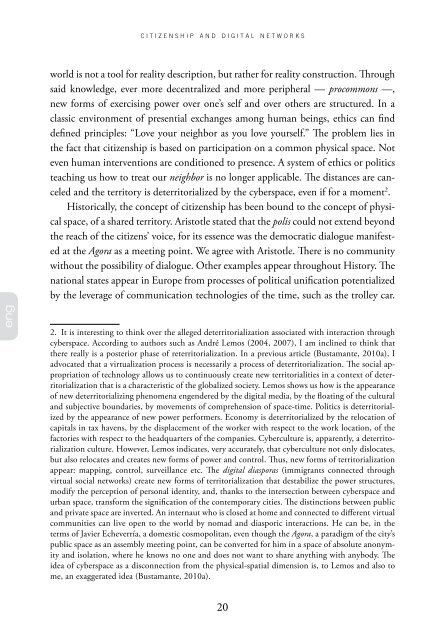Sergio Amadeu da Silveira - Cidadania e Redes Digitais
Sergio Amadeu da Silveira - Cidadania e Redes Digitais
Sergio Amadeu da Silveira - Cidadania e Redes Digitais
You also want an ePaper? Increase the reach of your titles
YUMPU automatically turns print PDFs into web optimized ePapers that Google loves.
eng<br />
c i t i z e n s h i p a n d d i g i t a l n e t w o r k s<br />
world is not a tool for reality description, but rather for reality construction. Through<br />
said knowledge, ever more decentralized and more peripheral — procommons —,<br />
new forms of exercising power over one’s self and over others are structured. In a<br />
classic environment of presential exchanges among human beings, ethics can find<br />
defined principles: “Love your neighbor as you love yourself.” The problem lies in<br />
the fact that citizenship is based on participation on a common physical space. Not<br />
even human interventions are conditioned to presence. A system of ethics or politics<br />
teaching us how to treat our neighbor is no longer applicable. The distances are canceled<br />
and the territory is deterritorialized by the cyberspace, even if for a moment 2 .<br />
Historically, the concept of citizenship has been bound to the concept of physical<br />
space, of a shared territory. Aristotle stated that the polis could not extend beyond<br />
the reach of the citizens’ voice, for its essence was the democratic dialogue manifested<br />
at the Agora as a meeting point. We agree with Aristotle. There is no community<br />
without the possibility of dialogue. Other examples appear throughout History. The<br />
national states appear in Europe from processes of political unification potentialized<br />
by the leverage of communication technologies of the time, such as the trolley car.<br />
2. It is interesting to think over the alleged deterritorialization associated with interaction through<br />
cyberspace. According to authors such as André Lemos (2004, 2007), I am inclined to think that<br />
there really is a posterior phase of reterritorialization. In a previous article (Bustamante, 2010a), I<br />
advocated that a virtualization process is necessarily a process of deterritorialization. The social appropriation<br />
of technology allows us to continuously create new territorialities in a context of deterritorialization<br />
that is a characteristic of the globalized society. Lemos shows us how is the appearance<br />
of new deterritorializing phenomena engendered by the digital media, by the floating of the cultural<br />
and subjective boun<strong>da</strong>ries, by movements of comprehension of space-time. Politics is deterritorialized<br />
by the appearance of new power performers. Economy is deterritorialized by the relocation of<br />
capitals in tax havens, by the displacement of the worker with respect to the work location, of the<br />
factories with respect to the headquarters of the companies. Cyberculture is, apparently, a deterritorialization<br />
culture. However, Lemos indicates, very accurately, that cyberculture not only dislocates,<br />
but also relocates and creates new forms of power and control. Thus, new forms of territorialization<br />
appear: mapping, control, surveillance etc. The digital diasporas (immigrants connected through<br />
virtual social networks) create new forms of territorialization that destabilize the power structures,<br />
modify the perception of personal identity, and, thanks to the intersection between cyberspace and<br />
urban space, transform the signification of the contemporary cities. The distinctions between public<br />
and private space are inverted. An internaut who is closed at home and connected to different virtual<br />
communities can live open to the world by nomad and diasporic interactions. He can be, in the<br />
terms of Javier Echeverría, a domestic cosmopolitan, even though the Agora, a paradigm of the city’s<br />
public space as an assembly meeting point, can be converted for him in a space of absolute anonymity<br />
and isolation, where he knows no one and does not want to share anything with anybody. The<br />
idea of cyberspace as a disconnection from the physical-spatial dimension is, to Lemos and also to<br />
me, an exaggerated idea (Bustamante, 2010a).<br />
20


